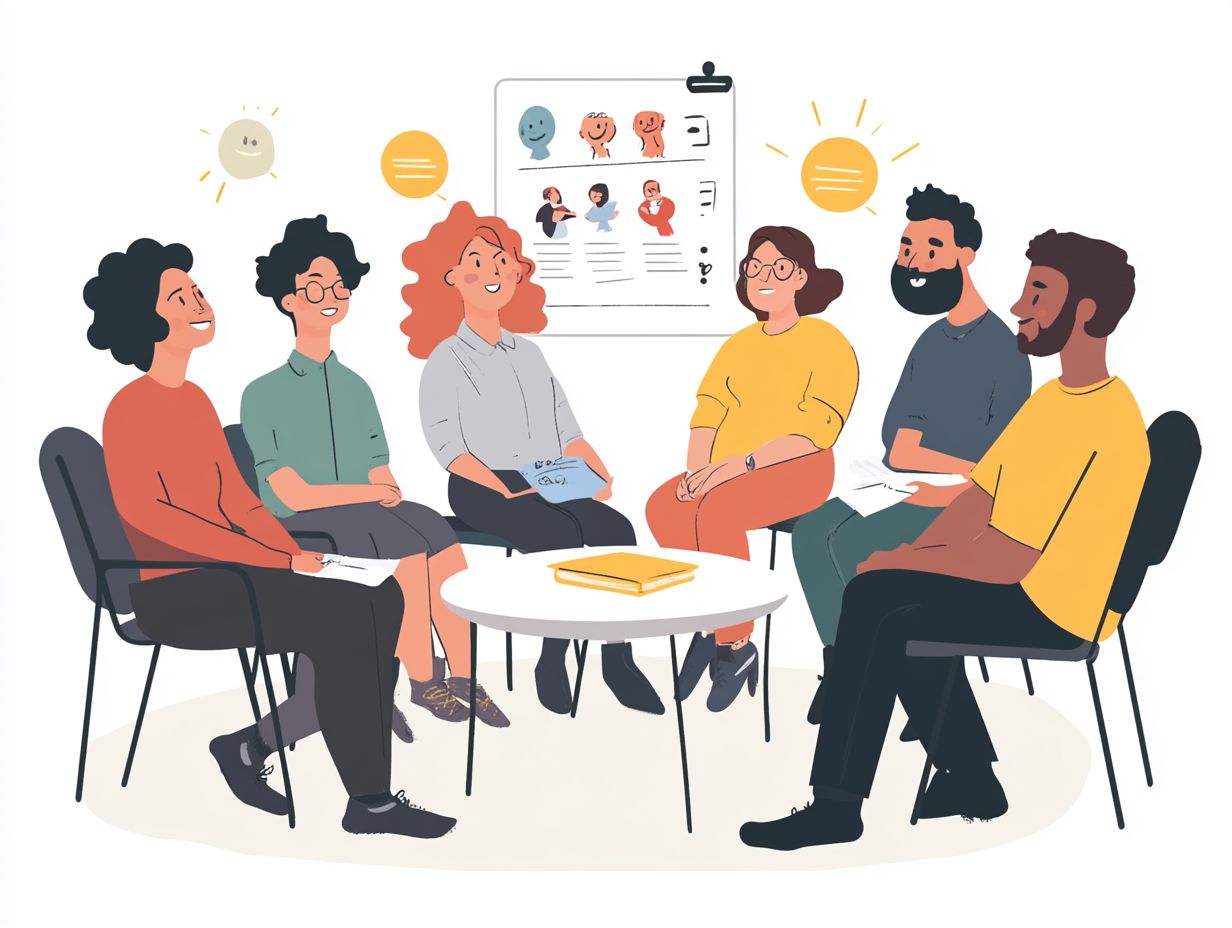5 Activities for Building Emotional Intelligence
Contents
- Enhancing Your Emotional Intelligence: A Practical Guide
- Key Takeaways:
- 1. Mindful Breathing Exercises
- 2. Journaling and Self-Reflection
- 3. Role-Playing and Empathy Exercises
- 4. Practicing Active Listening
- 5. Mindfulness Meditation
- What Is Emotional Intelligence and Why Is It Important?
- What Are the Benefits of Having a High Level of Emotional Intelligence?
- How Can Emotional Intelligence Help in Personal and Professional Relationships?
- How Can Emotional Intelligence Be Applied in Daily Life?
- Frequently Asked Questions
- 5 Fun Activities to Boost Your Emotional Intelligence
- How Can Building Emotional Intelligence Benefit You?
- Can Anyone Build Emotional Intelligence?
- Are There Any Other Benefits to Building Emotional Intelligence?
- How Often Should You Do These Activities?
- Can These Activities Be Done Alone or with Others?
Enhancing Your Emotional Intelligence: A Practical Guide
Emotional intelligence, often measured by your emotional quotient (EQ), is an essential skill that influences all facets of your life. It shapes everything from personal relationships to professional achievements.
This guide delves into five engaging emotional intelligence activities such as mindful breathing exercises and journaling that can effectively enhance your emotional intelligence. It addresses the key components of emotional intelligence, its importance, and practical methods for incorporating it into your daily routine. This promotes personal and professional development.
Whether you aim to boost your self-awareness or deepen your connections with others, this guide is packed with insights that can transform your personal growth. It includes emotional intelligence exercises and self-improvement efforts.
Key Takeaways:

- Practice mindful breathing exercises to improve emotional control and reduce stress.
- Use journaling and self-reflection to identify and manage your emotions effectively.
- Engage in role-playing and empathy exercises to enhance emotional understanding, relationship skills, and communication.
1. Mindful Breathing Exercises
Mindful breathing exercises are invaluable emotional intelligence practices. They nurture self-awareness and self-management, resulting in improved workplace communication and relationship skills.
These exercises help you manage your emotions better. When you and your team members engage in mindful breathing techniques, you not only soothe your body’s stress response but also create a space for deeper reflection on your feelings.
For instance, a simple practice like counting your breaths can ground you. This allows you to identify emotional triggers and responses with clarity. Participating in breath-focused activities as a group enhances your emotional vocabulary. You share experiences and insights, fostering deeper emotional connections and a supportive team atmosphere.
As everyone learns to articulate their feelings through these practices, you cultivate a more supportive environment. This significantly enhances collaboration and understanding within your team.
2. Journaling and Self-Reflection
Journaling and self-reflection are cornerstone emotional intelligence activities that promote growth and improve feedback.
Journaling and self-reflection are two powerful tools that can significantly boost your emotional intelligence. They pave the way for greater self-awareness and personal development. By engaging in these activities, you enhance your emotional quotient (EQ) and improve your ability to receive and give feedback.
These practices invite you to dive deep into your thoughts, feelings, and experiences. They help you gain a clearer understanding of your emotional landscape. As you make a habit of these techniques, you ll uncover behavioral patterns and reactions that might not be immediately apparent.
For example, asking yourself questions like “What were the highlights and lowlights of my day?” or “How did a specific event make me feel?” can spark valuable insights that encourage your growth.
Reflective writing assists you in processing your emotions and sharpens your emotional intelligence. It identifies your triggers and responses, leading to a more profound connection with yourself. This enriches your overall emotional journey and understanding.
3. Role-Playing and Empathy Exercises
Role-playing and empathy exercises are essential emotional intelligence tools that enhance your ability to cultivate empathy skills and strengthen emotional connections within group dynamics. This, in turn, boosts overall team cohesion and interpersonal relationships.
These techniques invite you to step into the shoes of your colleagues, encouraging you to reflect on the diverse perspectives and challenges they face. For example, your team might participate in scenarios designed to simulate difficult conversations or conflict resolution, providing a safe space to hone your empathy skills and communication skills.
Engaging in these hands-on experiences fosters a deeper understanding of each other’s emotional states while promoting a culture of trust and support. As you navigate these emotional connection exercises, you’ll likely discover that your collaborative efforts forge stronger bonds and a shared sense of identity.
Ultimately, this paves the way for collective success in the workplace. Start practicing these techniques today to transform your workplace dynamics!
4. Practicing Active Listening

Active listening greatly enhances your emotional intelligence and is essential for effective communication.
This approach involves fully focusing on the speaker, acknowledging their emotions, and responding thoughtfully. By doing this, you not only demonstrate empathy but also build trust and rapport with your colleagues. Techniques such as reflecting back what was said, asking clarifying questions, and avoiding interruptions can transform your interactions.
For example, during meetings, when a team member feels heard and understood, it creates an open environment where ideas can truly flourish.
In conflict resolution, active listening can help de-escalate tensions, paving the way for more collaborative dialogue and stronger relationships. This leads to a more harmonious and productive workplace, enhancing the overall emotional intelligence culture that everyone can benefit from.
5. Mindfulness Meditation
Mindfulness meditation plays a pivotal role in fostering your emotional intelligence by enhancing self-regulation, promoting growth in emotional awareness, and cultivating a positive psychological approach to both personal and professional challenges, as emphasized by experts like Daniel Goleman.
This practice helps you connect deeply with your thoughts and feelings, allowing you to respond thoughtfully rather than react impulsively to challenging situations. By nurturing a sense of presence and focus, you can develop greater emotional resilience, adaptability, and patience, which are critical for managing emotions effectively.
To seamlessly integrate mindfulness into your daily routine, consider:
- Starting each day with short meditation sessions,
- Engaging in deep-breathing exercises during stressful moments, or
- Taking mindful walks to reconnect with your surroundings.
These small yet powerful habits can lead to profound improvements in your emotional regulation over time, reinforcing self-control and enhancing your interpersonal relationships, ultimately contributing to a friendly team atmosphere.
What Is Emotional Intelligence and Why Is It Important?
Emotional intelligence, often known as your emotional quotient (EQ), is your ability to understand and manage your emotions effectively. This skill is crucial for your leadership potential, workplace success, and the development of strong interpersonal relationships. Regular emotional intelligence assessments can help track your progress and identify areas for improvement.
At its core, emotional intelligence includes vital skills like emotional awareness, empathy, self-regulation, and social skills. These abilities empower you to navigate complex social landscapes with ease. In leadership roles, for instance, possessing high emotional intelligence allows you to connect deeply with your team. This fosters trust and collaboration, significantly enhancing overall productivity and group efficacy.
In the workplace, effective communication fueled by emotional understanding becomes a powerful tool for conflict resolution and supports a positive organizational culture. When you are attuned to your own emotions and those of others, it not only contributes to your personal growth but also creates an environment where everyone feels valued and understood. This ultimately leads to healthier relationships and a more cohesive team dynamic.
The key components of emotional intelligence encompass self-awareness, self-management, social awareness, and empathy. Together, these elements form a holistic emotional intelligence framework that can elevate both your personal and professional interactions.
Each of these components plays an essential role in shaping effective leadership and nurturing robust team dynamics. Self-awareness is all about recognizing your own emotions and understanding how they influence your thoughts and behaviors. This allows you to make informed decisions rather than letting unchecked feelings dictate your actions. Emotional intelligence workshops often emphasize these components to cultivate effective leadership skills.
Self-management complements this by equipping you to regulate your emotions, ensuring that your reactions remain constructive even under pressure. Social awareness involves perceiving and understanding the emotions of others, which enables you to forge deeper connections with your team members.
Empathy takes it a step further; it s not just about understanding but also responding to your team s needs and concerns with genuine compassion. This approach significantly boosts morale and fosters collaboration. Together, these components create a powerful synergy that enhances your individual capabilities and unites teams, driving greater organizational success.
How Can Emotional Intelligence Be Developed and Improved?

You can develop and enhance your emotional intelligence through targeted self-awareness activities, effective tools, and strategies that promote growth in both your personal and professional life.
Engaging in reflective practices like journaling allows you to gain deeper insights into your emotions, reactions, and triggers. Mindfulness meditation can be a powerful ally in fostering emotional regulation, as it encourages you to observe your feelings without judgment. Temperament analysis provides valuable insights into your inherent emotional tendencies.
Another valuable approach is practicing active listening exercises, where you focus entirely on the speaker. This not only enhances your empathy but also strengthens your interpersonal connections and empathy skills. By setting daily intentions related to your emotional responses, you can consistently apply these skills, cultivating a more emotionally intelligent approach to your everyday interactions, which is central to personal development.
Start your journey to emotional intelligence today and see the transformative effects in your personal and professional life!
In conclusion, developing emotional intelligence is vital for personal growth and professional success. Engaging with the activities and practices outlined in this article can significantly enhance your emotional awareness, improve your relationships, and boost your leadership capabilities.
What Are the Benefits of Having a High Level of Emotional Intelligence?
Possessing a high level of emotional intelligence brings a wealth of benefits your way. These benefits include improved teamwork, team cohesion, enhanced leadership capabilities, and superior communication skills essentials for achieving personal and professional success. A high emotional quotient is also crucial for these benefits.
With emotional intelligence, you gain the ability to understand and manage your emotions more effectively. This allows you to navigate interpersonal dynamics with remarkable ease. For instance, imagine being the team member who, with high emotional awareness, can deftly mediate conflicts. You create a collaborative atmosphere and a strong team identity where everyone feels valued and heard. This is a prime example of understanding emotions and group dynamics at play.
As a leader, demonstrating emotional intelligence equips you to recognize the needs and motivations of your team. This inspires loyalty and drives productivity, thus enhancing team cohesion. This skill set also facilitates clearer communication. When you master emotional intelligence, you can tailor your messages to resonate with others, ensuring that your ideas are conveyed effectively. This fosters an environment where feedback flows freely. This shows how important emotional intelligence is in leadership.
How Can Emotional Intelligence Help in Personal and Professional Relationships?
Emotional intelligence plays a pivotal role in building better personal and professional relationships. It enhances your interpersonal skills, fosters empathy, and promotes emotional connection qualities that are absolutely essential for effective workplace communication. Consistent practice of emotional intelligence exercises can significantly improve these areas.
When you cultivate a strong sense of emotional intelligence, you become more attuned to the feelings and perspectives of those around you. Picture a manager who practices emotional understanding and social awareness. This manager can truly support team members during stressful projects by recognizing when someone is feeling overwhelmed. Instead of merely pushing for results in a one-on-one meeting, this manager might take a moment to ask how the employee is coping and offer assistance. This creates a supportive atmosphere and improves team cohesion.
In personal relationships, it’s no different. A friend who actively listens and empathizes can help resolve conflicts much more effectively. Whether navigating a quarrel or helping a loved one through grief, this emotional sensitivity you develop fosters stronger bonds and deeper trust. Understanding and expanding your emotional vocabulary can also play a crucial role in these interactions.
How Can Emotional Intelligence Be Applied in Daily Life?
You can apply emotional intelligence in your daily life through various practices that elevate your interpersonal interactions. Consider self-motivation, effective criticism management, and engaging in emotional connection exercises. These emotional intelligence practices are part of an effective emotional intelligence framework for daily life.
By practicing active listening during conversations, you not only demonstrate empathy but also gain a deeper understanding of the emotions of those around you. This fosters more meaningful connections and enhances your empathy skills. Journaling is another powerful tool. It allows you to reflect on your daily emotional experiences, aiding in self-improvement efforts and helping identify patterns and triggers that influence your reactions.
Consider role-playing scenarios; stepping into someone else’s shoes can cultivate your compassion and refine your conflict-resolution skills. These emotional intelligence activities can significantly enhance your emotional skills. Incorporating mindfulness techniques into your daily routine whether through deep-breathing exercises or meditation plays a crucial role in enhancing your self-awareness and emotional regulation. This ultimately boosts your overall emotional intelligence. Engaging in emotional intelligence workshops can also be beneficial.
Frequently Asked Questions

5 Fun Activities to Boost Your Emotional Intelligence
1. Mindfulness meditation: Practicing mindfulness helps improve self-awareness (the ability to recognize your emotions) and managing your emotions, both important components of emotional intelligence. This practice contributes significantly to your emotional growth.
2. Role-play exercises: These emotional intelligence activities involve acting out different emotional scenarios. This helps develop empathy and perspective-taking skills, which are crucial for enhancing emotional intelligence.
3. Journaling: Writing down your thoughts and feelings can significantly improve your understanding of your emotions. This aids in emotional assessment and helps you spot areas for improvement.
4. Active listening: Engaging in active listening exercises directly improves your communication skills and increases empathy toward others. These exercises are key emotional intelligence tools for enhancing workplace communication.
5. Emotional check-ins: Take a few minutes each day to check in with yourself. Identify how you are feeling and why. This practice can help increase self-awareness and develop emotional management skills. Regular self-awareness activities like this can lead to significant improvements in your emotional intelligence.
How Can Building Emotional Intelligence Benefit You?
Developing emotional intelligence can lead to improved relationships, better communication, and increased self-awareness. It can also help manage stress and improve your overall well-being. Understanding the definition of emotional intelligence and its benefits motivates you to incorporate these practices into your life.
Can Anyone Build Emotional Intelligence?
Yes! Emotional intelligence can be learned and developed through practice and various activities. It is a skill that anyone willing to put in the effort can improve.
Are There Any Other Benefits to Building Emotional Intelligence?
Absolutely! Building emotional intelligence can also enhance your problem-solving skills, decision-making abilities, and leadership qualities. Additionally, it fosters a positive culture of emotional intelligence within teams and organizations.
How Often Should You Do These Activities?
It is recommended to practice these activities regularly to see the most benefits. Setting a consistent schedule, such as a few times a week, will help you establish a routine. Don’t wait start incorporating these activities into your daily life! Participation in emotional intelligence workshops can also reinforce these habits.
Can These Activities Be Done Alone or with Others?
Both! Some activities, like journaling and mindfulness meditation, can be done alone. Others, such as role-play exercises and emotional check-ins, can be done with a partner or group to enhance the learning experience. Incorporating team activities can further strengthen group identity and group efficacy within your circles.
Call to Action: Start enhancing your emotional intelligence today! Choose an activity that resonates with you and make it part of your routine. Share your experiences and insights on this journey!






